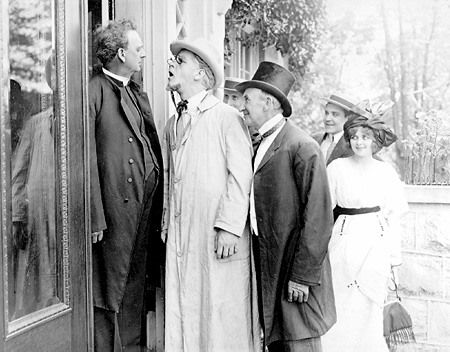 Volume II: Filmography
Volume II: Filmography Volume II: Filmography
Volume II: Filmography

Production still with Justus D. Barnes (Left) and Muriel Ostriche (Right). (F-600)
August 31, 1913 (Sunday)
Length: 1 reel (1,000 feet)
Character: Comedy-drama
Scenario: Philip Lonergan
Cast: Muriel Ostriche (Sue, the little milliner), Riley Chamberlin (Dick, an elderly farmer), Nolan Gane; other characters were named: May, Dick's sister; Jack, a middle-aged farmer, whom May adores; Jim, a polite tramp; men and women spectators at post office and in picnic scene (as given in Reel Life, August 30, 1913)
Notes: 1. At the time he produced this scenario for Thanhouser, Philip Lonergan was devoting most of his time to writing scripts for Majestic. 2. The August 30, 1913 issue of Reel Life featured a picture on page 19 captioned "The Trade Secret" and identified as a Thanhouser film. The attribution was incorrect; The Trade Secret was a Majestic release of August 31, 1913.
SYNOPSIS, The Moving Picture World, September 6, 1913:
"Men were scarce in the little village, but a maiden lady well advanced in years was exceedingly hopeful that she would win a bachelor upon whom she had set her heart. He was a well-to-do farmer and seemed thoroughly satisfied to spend his evenings with her. A little milliner opened a shop in the village, a distractingly pretty woman whom all the men liked and all the woman cordially detested. The milliner looked with favor upon the spinster's suitor and promptly took him away with her. The happy conversations in the stiff old parlor were things of the past and never seemed likely to come again. The woman was very unhappy. Cupid seemed to have deserted her, but she found one of his aids in the chicken coop one evening. He was a tramp who had wandered in to annex some of their poultry. The spinster's brother, a crusty old bachelor, would have taken the tramp to prison, but his sister interfered, for an idea had suddenly flashed into her head.
"The next day an article appeared in the local paper, stating that a French nobleman was visiting the family. Everyone was very much interested and the excitement was very much greater when they beheld the nobleman himself. It was the tramp, but a liberal application of soap and good clothes had completely transformed him, and he bore himself with an assured and haughty air. The popularity of the spinster was greatly intensified, particularly as it was whispered that she would probably become the count's bride. Her former suitor became very jealous. He realized her good traits and despite the efforts of the milliner, he proposed to the spinster and she promised to marry him. The tramp 'nobleman,' once more in rags, left the village, but not alone, for he carried with him the fattest pullet in the farmyard. 'It certainly was coming to him,' the farmer said to his sister, and she agreed with him."
REVIEW, The Morning Telegraph, September 7, 1913:
"Philip Lonergan has written this clever little farce. The idea is original, the business of the piece good, and altogether it is an excellent offering. The story is of an old maid who, believing in the old adage, 'Get a man jealous and he's yours,' hired a tramp to impersonate a sweetheart. When the lady's ruse has proven successful, the tramp is seen tramping out of town, glad to be rid of his job, and somewhat better off than when he entered upon his sweetheartly duties."
REVIEW, The Moving Picture World, September 6, 1913:
"The old maid catches a chicken thief and induces him to dress up in swell clothes and pose as her admirer. In this way she brings back the regard of her former lover. The plot is quite unique and entertaining, but the photos were somewhat hazy in places."
REVIEW, The New York Dramatic Mirror, September 10, 1913:
"An old maid, unable to persuade her suitor to pop the question, hurries him up by having a tramp, whom she catches robbing the henhouse, pose as a Wall Street broker [sic; the synopsis says French nobleman], and continually dance attendance upon her. This arouses the jealousy of the suitor, and he steps in and claims the old maid. The tramp is paid for his trouble, and everyone is happy. A perfectly legitimate and good comedy. A subtitle or two more and perhaps a better name for the whole would improve the offering, but it has a majority of good points, and therefore makes good entertainment. Acting is very good indeed."
# # #
Copyright © 1995 Q. David Bowers. All Rights Reserved.